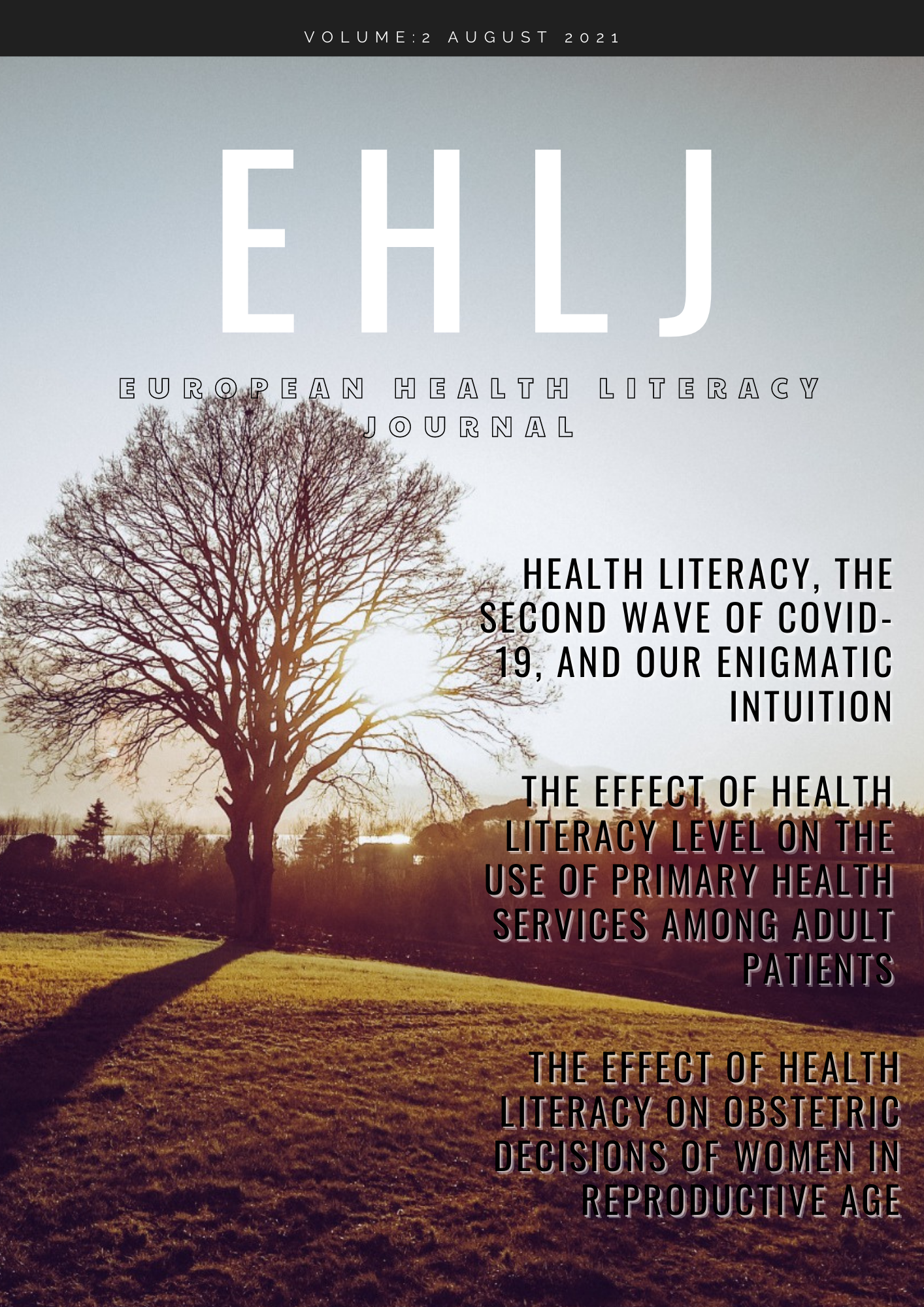Author :
Abstract
Keywords
Abstract
Aim In this study, it was aimed to investigate the effects of health literacy on obstetric decisions in women of reproductive age living in our region.
Methods: This study was carried out on 400 registered women aged 15-49 who voluntarily participated in the survey in January 2018 - April 2018 period. In the survey, a questionnaire questioning the sociodemographic characteristics of the patients and a Turkish translated Health Literacy Survey-European Union (HLS-EU-47) questionnaire were used to measure the level of health literacy.
Results: As a result of the research, in the reproductive age women living in our region, the health literacy was determined as 7.5% adequate / excellent. Mothers who breastfed their baby for 12 months were found to have higher levels of health literacy in terms of disease prevention than those who did not breastfeed or who breastfed for longer than 12 months (p= 0.022). The educational status of women was correlated with HLS-EU-47 scores (p< 0.001). Those with good income have higher scores on HLSEU-47 (p< 0.001). Health literacy was not found to have an impact on obstetric decisions to have OGTT and tetanus vaccination and influenza vaccination in pregnancy (p= 0.106; 0.362; 0.123 respectively). Participants who had a double screening test were found to have higher HLS-EU-47 scores in terms of disease prevention (p=0.005).
Conclusions: The rates of health literacy are quite low in women of reproductive age in our region. The impact of health literacy on obstetric decisions is shown in the study. Improving health literacy in women will have a direct impact on family health especially in terms of disease prevention.
Keywords
- 1. Kohan S, Mohammadi F, Yazdi M, Dadkhah A.Evaluation of relationship between reproductive healthliteracy and demographic factors in women. Journal of Health Literacy. 2018; 3(1): 20-29.
- 2. Zibellini J, Muscat DM, Kizirian N, Gordon A. Effectof health literacy interventions on pregnancyoutcomes: A systematic review. Women and Birth. 2021; 34(2): 180-186.
- 3. Khorasani EC, Sany SBT, Orooji A, Ferns G, PeymanN. Health literacy in Iranian women: a systematicreview and meta-analysis. Iranian Journal of Public Health, 2020; 49(5): 860.
- 4. (Lindau ST, Tomori C, Lyons T, Langseth L, BennettCL, Garcia P. The association of health literacy withcervical cancer prevention knowledge and healthbehaviors in a multiethnic cohort of women. Americanjournal of obstetrics and gynecology. 2002; 186(5): 938-943.)
- 5. (Kim K, Han HR. Potential links between healthliteracy and cervical cancer screening behaviors: asystematic review. Psycho‐Oncology. 2016; 25(2): 122-130.)
- 6. Sentell T, Braun KL, Davis J, Davis, T. Healthliteracy and meeting breast and cervical cancerscreening guidelines among Asians and whites in California. Springerplus. 2015; 4(1): 1-9.
- 7. Cho RN, Plunkett BA, Wolf MS, Simon CE, GrobmanWA. Health literacy and patient understanding ofscreening tests for aneuploidy and neural tube defects.Prenatal Diagnosis: Published in Affiliation With theInternational Society for Prenatal Diagnosis. 2007; 27(5): 463-467.
- 8. Delanoë, A., Lépine, J., Portocarrero, et al. Healthliteracy in pregnant women facing prenatal screeningmay explain their intention to use a patient decisionaid: a short report. BMC research notes. 2016; 9(1): 1-9. Senol D, Göl I, Ozkan S. The effect of health literacylevels of pregnant women on receiving prenatal care: across-sectional descriptive study. Int J Caring Sci. 2019; 1717-1724.
- 10. Castro-Sánchez E, Vila-Candel R, Soriano-Vidal FJ,Navarro-Illana E, Díez-Domingo J. Influence of healthliteracy on acceptance of influenza and pertussisvaccinations: A cross-sectional study among Spanishpregnant women. BMJ open. 2018; 8(7): e022132.
- 11. Dongarwar D, Salihu HM. Influence of sexual andreproductive health literacy on single and recurrentadolescent pregnancy in Latin America. Journal ofpediatric and adolescent gynecology. 2019; 32(5): 506-513.
- 12. Lori JR, Dahlem CHY, Ackah JV, Adanu RM.Examining antenatal health literacy in Ghana. Journal of Nursing Scholarship. 2014; 46(6): 432-440.
- 13. (Kilfoyle KA, Vitko M, O'Conor R, Bailey SC. Healthliteracy and Women's reproductive health: asystematic review. Journal of women's health. 2016; 25(12): 1237-1255.)
- 14. AYDIN D, ABA YA. Annelerin Sağlık OkuryazarlığıDüzeyleri ile Emzirme Öz-Yeterlilik Algıları Arasındakiİlişki. Dokuz Eylül Üniversitesi Hemşirelik Fakültesi Elektronik Dergisi. 2019; 12(1): 31-39.
- 15.Hakkak H, Joveini H, Rajabzadeh R, RobatsarpooshiD, Tori N, Haresabadi M, Hosseini S. Health literacylevel and related factors among pregnant womenreferring to bojnord health centers in 2017.International Journal of Pharmaceutical Research. 2019; 11(1): 152-158.
- 16. Lee HY, Lee J, Kim NK. Gender differences inhealth literacy among Korean adults: do women havea higher level of health literacy than men?. American journal of men's health. 2015; 9(5): 370-379.
- 17.Vila‐Candel R, Soriano‐Vidal FJ, Mena‐Tudela D,Quesada JA, Castro‐Sánchez E. Health literacy ofpregnant women and duration of breastfeedingmaintenance: A feasibility study. Journal of Advanced Nursing. 2021; 77(2): 703-714.
- 18. Charoghchian Khorasani E, Peyman N, Esmaily H.Relations between breastfeeding self-efficacy andmaternal health literacy among pregnant women. Evidence Based Care. 2017; 6(4): 18-25.
- 19. Shea TL. Health Literacy, Understanding, andDecisional Satisfaction in Women's Decision-Making forPrenatal Aneuploidy Screening. The University of North Carolina at Greensboro. 2018.
- 20.Yee LM, Simon MA. The role of health literacy andnumeracy in contraceptive decision-making for urbanChicago women. Journal of community health. 2014; 39(2): 394-399.
- 21. El-Ibiary SY, Youmans SL. Health literacy andcontraception: a readability evaluation of contraceptiveinstructions for condoms, spermicides and emergencycontraception in the USA. The European Journal ofContraception & Reproductive Health Care. 2007;





